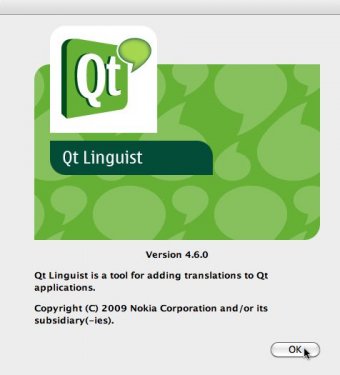

Software patent retaliation – Where all users of the software are granted licenses thus making software patent retaliation of any potentially patented software in the distributed software meaningless.DRM and hardware encryption – This cannot be used to circumvent these obligations.Tivoization – Explicitly not allowing creation of closed devices where the end user does not have the LGPL granted rights for the Qt open source libraries.
Qt linguist install#
You have to provide means to the end user to install a modified version of the library licensed under LGPLv3 and run your software using that modified library. LGPLv3 makes this intention very explicit. Both licenses have the same intention, namely to protect the freedom of users to use and modify the software licensed under LGPL. LGPLv2.1 is an older version and not recommended by the Free Software Foundation for new projects anymore. LGPLv3 is the current version of the GNU Lesser General Public License. What is the consequence of not complying with the LGPL/GPL restrictions?
Qt linguist license#
The license agreement has been updated couple of times over the years, mainly because of acquisitions around Qt or updates to licenses and platforms. (the legal non-profit organization behind KDE) in 1998 and it has a license agreement that ensures the availability of Qt under LGPLv3 and GPLv3 licenses for major desktop and mobile platforms. The Foundation was originally founded by Trolltech and the KDE e.V. The KDE Free Qt Foundation is an organization with the purpose of securing the availability of the Qt toolkit for the development of Free Software and in particular for the development of KDE software. As a result, the KDE Free Qt Foundation was founded and the KDE Free Qt Foundation Agreement created. Compromises with KDE were sought to ensure that Qt would be available for their use under appropriate open source licensing even if Trolltech (the company that founded Qt) would be acquired or go bankrupt.
Qt linguist code#
In the very early days, Qt was already dual-licensed, but the source code was available under proprietary open source licenses. In the early days of Qt, the KDE project and community were the biggest driving force in building the developer ecosystem around Qt. KDE software is based on the Qt framework. KDE is mainly known for its Plasma Desktop environment, which is provided as the default work environment on many Linux distributions. KDE ( kde.org) is an international free software community, founded in 1996, producing an integrated set of cross-platform applications for desktop. How does commercial Qt licensing work? Do all my developers need to have a valid Qt license? The Qt Company exists to support both sets with the dual offering. The Free Software community has thrived because of these rules, but there are also developers who never intend to observe or cannot comply to these rules, and thus should get a commercial license. The freedoms are non-negotiable and absolute, the freedoms cannot be enjoyed selectively or partially, you also need to pass them to your users.

The freedom to improve the program and release your improvements to the public, so that the whole community benefits.The freedom to redistribute copies so you can help your neighbor.The freedom to study how the program works and adapt it to specific needs.The freedom to run the program for any purpose.Use of open source licensing gives users four primary degrees of freedom when using Qt applications or devices: We believe in the Free Software movement where using software comes with certain rights, but also certain obligations. Ĭheck out which components are available under the different open source models in the Qt Product Map. Qt also ships with third party open source components that might require respective licensing compliancy, if used. Please note that there are parts of Qt that are only provided under GPL for open source users that will require you to license your application under a GPL compatible license. This is the primary open source Qt license, which covers the majority of Qt modules. LGPL – Any modification to a Qt component covered by the GNU Lesser General Public License must be contributed back to the community. Your users are granted rights founded on the four freedoms of the GNU General Public License.
Qt linguist full#
GPL – All users have the rights to obtain, modify and redistribute the full source code of your application. When selecting an open source license for your project, you contribute to free and open source software development by using Qt under any of the following licenses: LGPL version 3, GPL version 2 and GPL version 3.īasic Premises of the Qt Open Source Model


 0 kommentar(er)
0 kommentar(er)
